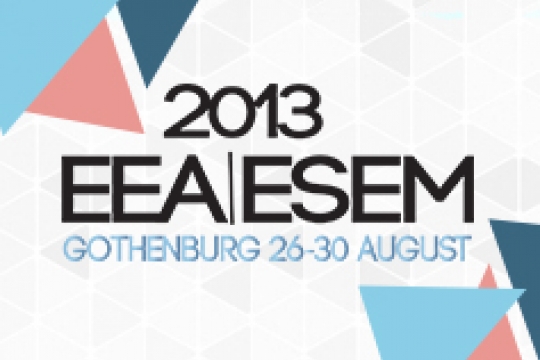Event Information
Contact
The Department of Economics at the University of Gothenburg is delighted to be hosting the 28th annual congress of the European Economic Association and the 67th European meeting of the Econometric Society, August 26-30, 2013. For more information, please wisit the EEA-ESEM congress website
At the conference on the 29th of August 13.00-14.00 the EfD is chairing a memorial session in honor of Elinor Ostrom in Malmstensalen (Handelshögskolan), where Thomas Sterner, Somanathan and Scott Barett will all present recent publications.
Scott Barrett will talk about the paper “When Early Warning of Collapse Can Rescue the Commons from Tragedy” by Scott Barrett (Columbia University) and Astrid Dannenberg.
Abstract. A conflict between individual and collective interests can lead to free riding, overexploitation, and even collapse if the resource is prone to “tipping.” The prospect of crossing a critical threshold, however, also offers an opportunity to reverse the incentive to free ride. Using an experiment, rooted in a game theoretic model, we show that behavior differs dramatically either side of a dividing line for threshold uncertainty. By reducing threshold uncertainty to the “good” side of the dividing line, the new science of early warning signals can trigger the behavioral regime shift needed to rescue the commons from tragedy.
E. Somanathan will discuss the paper "The Evolution of meaningful and credible climate agreements" by E. Somanathan (Indian Statistical Institute, Delhi) and Shoibal Chakravarty.
Summary. The talk will examine the evolution of international cooperation in climate change. It is shown that an efficient subgame-perfect treaty exists in a continuous-time framework, but is in the core of the associated cooperative game with externalities only at certain times. The cooperative game with externalities is defined assuming that coalitions play joint best responses to each other.
Thomas Sterner will talk about the paper “Grandfathering” by Maria Damon, Daniel Cole, Elinor Ostrom and Thomas Sterner (University of Gothenburg):
Abstract. In this paper we analyze the role played by grandfathering in various allocation and policy mechanisms. Grandfathering is the principle that historical use gives a claim or right to future use. It can be a useful mechanism when gathering for instance the stakeholders in an irrigation system, fishery or other common pool resource in order to bring them to the table and start the process of discovering and analyzing the use patterns in order to understand the resource and agree on future management. If however grandfathering is always used – and expected – as a principle, then this considerably dampens the incentives for proactive behavior and can even act as a perverse incentive to overuse a resource in order to secure “a good baseline” in future user agreements.
On the opening day, Monday 26/8 Måns Söderbom is chairing the lunch session in Malmstensalen (12.30-14.00) on "Structural change and natural resources in developing countries".
Invited panelists are:
Mthuli Ncube, African Development Bank
John Page, The Brookings Institution
Rick van der Ploeg, University of Oxford
Ryong Yoon, Korean Institute of International Economic Policy
Abstract. Lack of gainful employment opportunities remains a serious threat to sustained and inclusive growth in poor countries. Structural transformation, which entails the movement of resources and labour from traditional activities to the modern sector, can be a forceful engine of job creation. Abundant natural resource wealth can provide the base for structural transformation, but also poses significant challenges. This session will investigate the connections between structural transformation and natural resources in developing countries, and the implications for growth and poverty reduction.
EfD will also have an exhibition stand among the other exhibitors.
